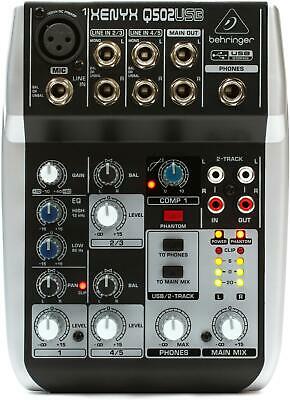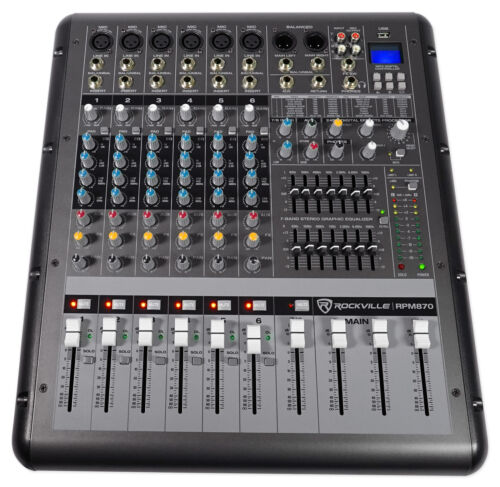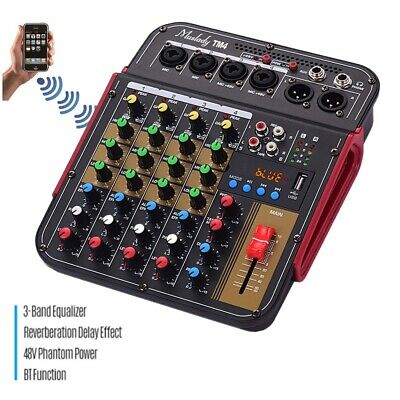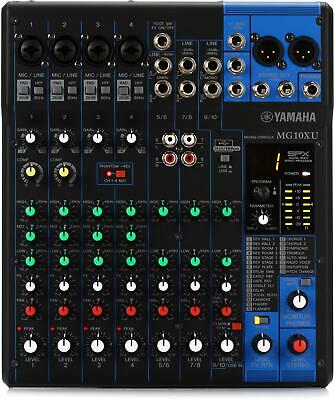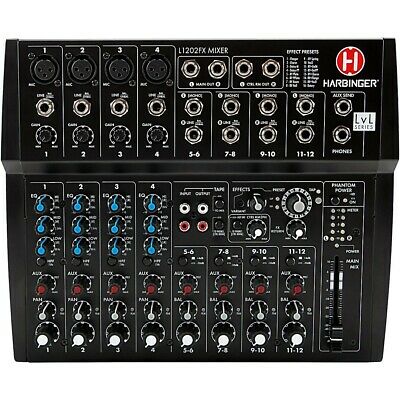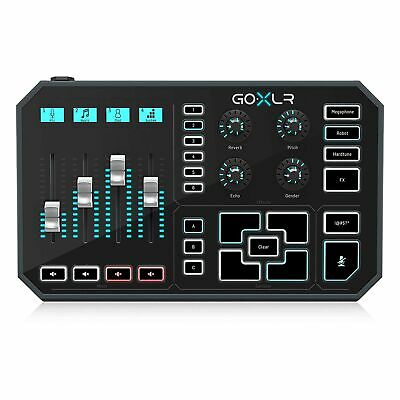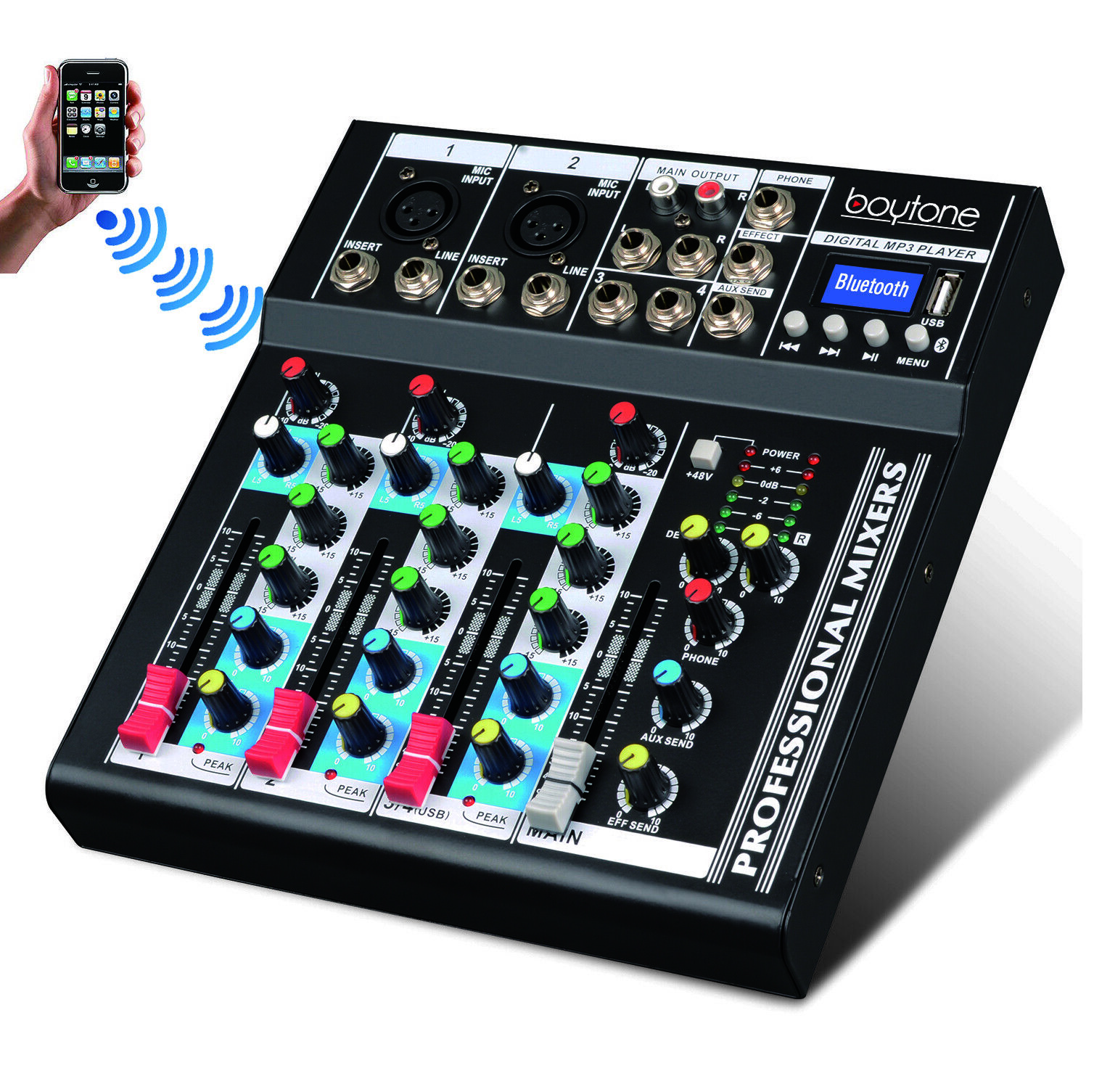-40%
Presonus Studiolive 32.4.2 ai 100% Live/Rec. Sound Mixer From Local Auditorium
$ 712.79
- Description
- Size Guide
Description
This mixer 100% professionally tested, It is missing the SUB 2 Knob and post but the fader works, A
ll functions, buttons and sliders work as they should. It is from a school auditorium. Includes only the power cord.
If you are looking at this mixer you know the thousands + features they have. If you are familiar with the StudioLive non AI or thinking of buying a used one, please reconsider. The AI model is a gigantic leap in mixing tech for not much more money.
Here is some info on the advances and features.
Following up on the stunning success of its StudioLive™-series digital mixers, PreSonus® today introduced the StudioLive 32.4.2AI 32-channel performance and recording digital mixer. This new mixer features next-generation Active Integration technology, including a dual-core computing engine that packs over 64 times the processing power and an incredible 10,000 times more RAM than the previous top-of-the-line StudioLive 24.4.2. Its sophisticated, integral communications also makes possible wireless control of the mixer without requiring an external computer.
Featuring 32 Class A XMAX™ mic preamps with individually switched phantom power (plus an XMAX preamp for the Talkback input with always-on phantom), 32 line inputs, 14 aux mixes, 4 subgroups with variable output delay, Fat Channel dynamics processing and parametric EQ, a 48x34 FireWire S800 audio interface, and much more, StudioLive 32.4.2AI takes affordable digital mixing to a new level of sophistication.
Yet the new model retains the ease of use and fast workflow that helped make StudioLive mixers a worldwide success. All of the core mixing features are under your fingers, with no awkward bank switching.
StudioLive 32.4.2AI incorporates the same Fat Channel features as the awardwinning StudioLive 24.4.2, including routing, panning, a high-pass filter and polarity reverse on every channel, and a full-feature gate, full-featured compressor, limiter, and 4-band fully parametric EQ on every channel, aux, subgroup, and effects bus. Taking advantage of the Active Integration engineʼs
massive processing power, the new mixer allows users to create two complete sets of EQ and dynamics settings for a channel and then make quick A/B comparisons with the Alt EQ/Dyn button.
Also new in this model are six mute groups with All On/All Off switches and six user-assignable Quick Scene Recall buttons that let you load specified, saved mixer scenes—sort of a speed dial for mixer scenes. The StudioLive 32.4.2AI also sports four internal effects buses: two with reverb and two with delay effects. Unlike previous models, the StudioLive 32.4.2AI sports an Ethernet port that allows you to connect to an existing router-based network with an Ethernet cable or completely wirelessly. You also get a USB 2.0 port to host the USB Wi-Fi LAN adapter for situations where a less powerful, ad hoc Wi-Fi network is sufficient. Using either wireless connection, the mixer can be directly controlled from a Windows or Mac laptop, iPad®, and the aux mixes can be controlled from an iPhone®, iPod touch® or Android device; a FireWire connection to a computer is not required.
FEATURES
33 mic high-headroom Class A XMAX mic preamplifiers (32 channels plus Talkback)
32 balanced TRS line inputs
4 subgroups
Stereo/mono main out
14 auxiliary mixes
48-in/34-out FireWire S800 digital recording interface (24-bit/44.1 kHz and 48 kHz)
Studio One Artist Digital Audio Workstation software for Mac and Windows
Capture 2.0 recording software for Mac and Windows
StudioLive Remote-AI mixer-control software for iPad available free from Apple App Store
QMix-AI aux-control software for iPhone and iPod touch available free from Apple App Store
Direct recording interface compatible with Logic, Nuendo, Cubase, Sonar, Digital Performer, Ableton Live, and more
60 channel strips
Trim control with -20 to +20 dBV line/-15 to +65 dBu mic gain range (80dB!)
+48V phantom power switch for condenser microphones
Digital Audio Input Select
100 mm precision faders
Lighted Solo and Mute buttons
6 mute groups with All On/All Off switches
Access to Fat Channel functions
15-LED ladder metering + clip LED
Analog ¼" insert (rear panel)
4 subgroup buses, each with:
Solo
Mute
Access to Fat Channel functions (except high-pass filter and phase reverse)
14 aux sends, each with
Solo
Mute
Pre/post-fader send
Output-level control
Access to Fat Channel functions (except phase reverse)
Mix and Mix/Pan Fat Channel value displays
Available sources: 32 input channels, Aux In A and B, Tape Input, Main digital-audio return, FXA, FXB, FXC, FXD, Talkback
4 internal effects sends (two reverbs, two delay effects), each with:
Mute
Pre/post-fader send
Output-level control
Access to Fat Channel (except phase reverse)
Effects-send Select for Fat Channel metering
Mix button for aux-bus mixing and Fat Channel value displays
Master Section
Aux Input A and B
Level Control and Select (Fat Channel metering) switch
Access to all Fat Channel functions (except phase reverse)
Talkback System
Mic Level control
Output Select (Aux 1-2, 3-8, 9-14, Main)
Talk button
Rear-panel XLR mic input with trim control and continuous 48V phantom power
2 Track In
Level control
Tape Input to Mains button
Main Digital Audio Return on/off
Solo Bus
Cue Mix volume control
PFL/AFL and Solo In Place (SIP) buttons
Latch, Radio, and CR Modes
Monitor Bus
Headphone-output level control
Control-room monitor-level control
Solo Bus to Monitor button
Tape Input to Monitor button
Main Digital Audio Return to Monitor button
Main Mix to Monitor button
Fat Channel with rotary encoders:
Pan with dedicated 15-LED display
Stereo link for input channels, aux buses, and subgroups
Phase reverse (main channels only)
High-pass filter: -6 dB/oct., sweepable from Off to 1 kHz (main channels and aux's only)
Gate: Threshold: 0 to -84 dB; Attack: 0.02 to 500 ms; Release: 0.05 to 2 sec; Bandpass Key Filter: 40 Hz to 16 kHz; second-order resonant bandpass filter Q (0.7) with Key Listen function
Compressor: Threshold -56 to 0 dB; Ratio 1:1 to 14:1, LIM=ˆž:1; Attack 0.2 to 150 ms; Release 2.5 to 900 ms; Makeup Gain 0 to 28 dB; Soft Knee switch; Auto Mode with 10 ms Attack and 150 ms Release
4-band fully parametric equalizer
Low EQ: sweepable from 36 Hz to 465 Hz, ±15 dB, switchable shelf or peaking
Low Mid EQ: sweepable from 90 Hz to 1.2 kHz, ±15 dB, variable Q 0.1 to 4.0
High Mid EQ: sweepable from 380 Hz to 5 kHz, ±15 dB, variable Q 0.1 to 4.0
High EQ: sweepable from 1.4 kHz to 18 kHz, ±15 dB, switchable shelf or peaking
Master EQ On/Off button
Limiter: variable Threshold -28 dBfs to 0, ˆž:1 Ratio
Alt EQ & Dyn button for quick A/B comparisons of two complete sets of Fat Channel settings for each channel and busOutput Assign: 4 subgroups and main
All settings can be copied among channels and buses and can be saved as user presets.
50 channel-strip presets for drums, bass, guitars, keyboards, and vocals
4 internal digital effects-processors (2 reverbs, 2 delays), each with 50 customizable presets
16 31-band graphic equalizers
Assignable to each aux bus and the Main bus
Scene Store and Recall
Global Scene Storage: all current StudioLive settings
Up to 80 at a time
6 Quick Scene buttons for instant Scene save/recall”like "speed dial" for Scenes
Automatic Global AutoStore
Customizable naming (for example, "Saturday Gig" or "Main Worship Service")
Individual channel-strip setting storage
Up to 48 at a time, plus¦
50 factory presets for instruments and vocal
Copy and Paste between channels
Can be browsed by category (DRM, VOX, HRN, GTR, BAS, MISC, SYS)
Lockout mode to keep inspired amateurs from changing your settings
Metering/Displays
24 x 16- LED Fat Channel matrix:
Pre-dynamics/pre-fader input
Post-dynamics/post-fader output
Gain reduction
Aux 1-14 and EFX A-D output
Fader-position recall
8 x 15-LED main meter bank
Selected channel level
Selected channel gain reduction
Sub buses 1 to 4
Main stereo outputs
15-LED horizontal Pan/Balance display
64 x 194 LCD matrix
Effects parameters
Scene creation, storage, and recall
System menus
Channel Info page with custom naming
GEQ Select
2-digit Channel Selected display
Input/Output
32 main inputs, each with XLR mic, ¼" line, and ¼" inserts
2 ¼" balanced stereo (L/R) aux inputs
1 XLR talkback-mic input with XMAX preamp, phantom power (always on), and level control
Unbalanced RCA stereo (L/R) tape inputs and outputs
XLR stereo (L/R) main outputs with level control
¼" balanced stereo (L/R) main outputs
XLR mono output with level control
¼" balanced stereo (L/R) control-room outputs
¼" headphone output
4 ¼" balanced subgroup outputs
14 ¼" balanced aux outputs
32 pre-insert, balanced direct outputs, Ch. 1-8, 9-16, 17-24, 25-32 (DB25 sockets)
Dedicated USB 2.0 port and included Wi-Fi LAN adapter for wireless communications
Installed Option Card with:
S/PDIF digital out
2 FireWire S800 ports
Optional I/O cards
Thunderbolt-FireWire S800-S/PDIF Out
Ethernet/Dante-FireWire S800-S/PDIF Out
Digital
High-definition analog-to-digital converters (118 dB dynamic range)
Unlimited-headroom, 32-bit floating point, digital mixing and effects processing
Internal sample frequency 44.1 kHz and 48 kHz
Physical
Rugged, non-flex steel chassis
100 mm long-throw faders
Military-grade, quick-touch buttons
BNC 12V lamp socket
Mac OS X 10.7.2 or later
Intel Core Duo processor (Intel Core 2 Duo or Core i3 or better recommended)
2 GB RAM (4 GB or more recommended)
Windows
Windows 7 x64/x86 SP1, Windows 8 x64/x86
Intel Core Duo or AMD Athlon X2 processor (Intel Core 2 Duo or AMD Athlon X4 or better recommended)
2 GB RAM (4 GB or more recommended)
Mac and Windows Systems
FireWire S800 (IEEE 1394b) port
Internet connection recommended
DVD-ROM drive
Internal or external 7200 RPM storage drive highly recommended
Monitor with 1024x768 resolution
The minimum system requirements may differ for DAWs other than Studio One. Please check the requirements for your DAW of choice with its manufacturer.
Note that the speed of your processor, amount of RAM and size and speed of your hard drive will greatly affect the overall performance of your recording system. Also, a more powerful system (faster processor with more RAM) will allow for lower latency (signal delay) than you might experience while monitoring audio or MIDI signals. Monitor resolution for both PC and Mac should be no lower than 1024x768 pixels.







